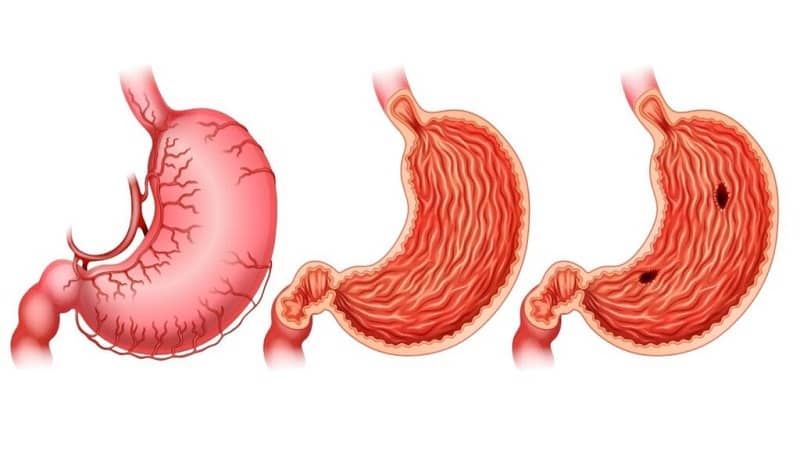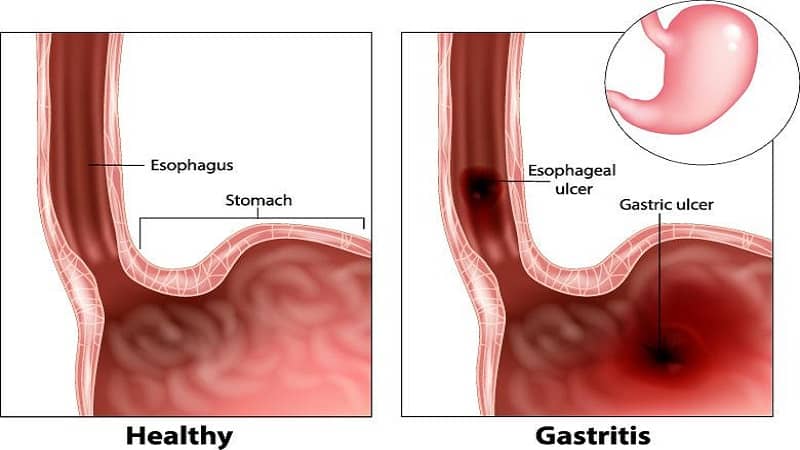Gastritis
Treatments
Gastritis
Gastritis is a condition characterized by inflammation of the lining of the stomach. It can be acute, meaning it occurs suddenly and is usually short-lived, or chronic, where it persists over time. Gastritis can be caused by various factors, including infection with the bacterium Helicobacter pylori, excessive alcohol consumption, prolonged use of nonsteroidal anti-inflammatory drugs (NSAIDs), stress, and autoimmune disorders.
Symptoms

Nausea and vomiting
Feeling nauseous and sometimes vomiting.

Indigestion
Discomfort or bloating after eating.

Loss of appetite
A decreased desire to eat.

Bloating
Feeling of fullness or discomfort in the abdomen.

Blood in vomit or stool
In severe cases, gastritis can lead to bleeding in the stomach, which may result in bloody vomit or black, tarry stools.

Abdominal pain
A dull ache or burning sensation in the upper abdomen, often worsened by eating.
Diagnosis
Endoscopy:
A flexible tube with a camera is inserted into the stomach to visually inspect the lining and take tissue samples (biopsy) for further analysis.
Blood tests:
Blood tests may be performed to check for infection with Helicobacter pylori or assess levels of certain blood cells and proteins indicative of inflammation.
Stool tests:
Stool samples may be tested for the presence of blood, which can indicate bleeding in the digestive tract.
Treatment

Medications
Proton pump inhibitors (PPIs): Drugs that reduce the production of stomach acid, helping to alleviate symptoms and promote healing of the stomach lining.
Antacids: Over-the-counter medications that neutralize stomach acid and provide temporary relief from symptoms.
H2 receptor blockers: Medications that decrease the production of stomach acid, similar to PPIs but with a different mechanism of action.
Antibiotics: If gastritis is caused by infection with Helicobacter pylori, a course of antibiotics may be prescribed to eradicate the bacteria.
Cytoprotective agents: Medications that help protect the lining of the stomach from further damage, such as sucralfate or misoprostol.
Dietary and lifestyle changes
Avoiding irritants
Avoiding spicy, acidic, or fatty foods that can exacerbate symptoms.
Limiting alcohol and caffeine
Both alcohol and caffeine can irritate the stomach lining and worsen gastritis symptoms.
Quitting smoking
Smoking can increase stomach acid production and delay healing of the stomach lining.
Stress management
Techniques such as relaxation exercises, meditation, and counseling can help reduce stress, which may contribute to gastritis.
Hydration
Drinking plenty of fluids can help soothe the stomach lining and prevent dehydration, especially if vomiting occurs.
Follow-up
Drinking plenty of fluids can help soothe the stomach lining and prevent dehydration, especially if vomiting occurs.
Complications

Peptic ulcers
Gastritis can lead to the development of ulcers in the stomach or small intestine, which can cause bleeding and other complications.

Gastric bleeding
In severe cases, gastritis can cause bleeding in the stomach, leading to bloody vomit or black, tarry stools.

Gastric cancer
Chronic gastritis, especially when caused by Helicobacter pylori infection, can increase the risk of developing stomach cancer over time.



